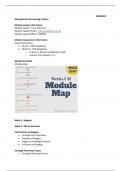MAN2017
Management Accounting 2 Notes
Module Leader Information
Module Leader: Tracy Robinson
Module Leader Email: t.robinson@surrey.ac.uk
Module Leader Officer: 34MS02
Module Assessment Information
Exam Information:
• Week 7- 30% Weighting
• Week 12- 70% Weighting
o 2 Hours in Person Handwritten Exam.
o Content from Weeks 1-11.
Module Schedule
Module Map:
Week 1- Budgets
Week 1- SBS on Demand
Introduction to Budgets
• Strategic Plan Overview.
• Purpose of Budgets.
• Stages in the Budget Process.
• Criticisms of Budgets.
Strategic Planning Process
1. Strategic Planning Process:
, a. (Specification of Objectives and Strategies).
2. Creation of Long-Term Plan to Implement Strategies.
3. Preparation of the Annual Budget within the Contest of the Long-Term Plan.
4. Monitor Actual Results.
5. Respond to Deviations from the Plan.
First Steps
• Preparation and communication of a strategic plan laying out vision and mission
statements and strategic objectives.
• Creation of a long-term plan describing actions to be taken to achieve the objectives.
• Preparation of the annual budget for shorter term implementation of the long-term
plan.
• Monitor results and compare to plan.
• Take corrective action or amend plans.
Why do we Produce Budgets?
• Planning.
o How much raw material to buy-in, how much do we expect to sell, how much
do we need to produce?
o Staffing requirement E.g., for expansion.
o Required amount of machinery.
• Co-ordination.
o Between departments:
▪ E.g., If the Sales department has spent a lot on marketing to produce
a sales drive, this needs to be communicated to the production
department to ensure the supply is there to match the increased
demand.
• Communication:
o Plans communicated to all of the departments.
o Communicated to each department to what they are accountable for.
• Motivation:
o For managers and employees.
, o Goals congruence.
o Provides a challenge.
▪ But not so challenging that they are demotivating if the targets are
unrealistic.
▪ Not so easy that employees don’t feel the need to improve.
• Control:
o Controls overspending.
o Minimise costs.
o Increase their margins.
o Directs attention at outliers- material variations from plan or budget.
o Management by exception:
▪ Analysed those exceptions.
• Performance:
o Analysed manager’s performance against targets set.
Conflicts
• Motivation vs Effective Planning:
o Setting targets that are slightly higher than achievable may provide
motivation for employees.
o But it is not going to provide effective planning because those budgets are
going to be set at a level that’s too high and not realistic.
• Planning vs. Performance Evaluation:
o A lot can change between January and December if budgets are set at the
start of the year.
▪ E.g., Covid Pandemic.
o Not realistic or fair or reasonable if there’s been an enormous shift in the
business, market or economy that is beyond a managers control to then
continue to use this as a means of evaluation a manager’s performance
Administration
• Budgets are presented to a budget committee for approval.
• A budget officer (usually an accountant) will co-ordinate the individual budgets.
• Accounting staff assist in budget preparation for each department- advisory and
clerical.
• Budget Manual- describes objectives, procedures, timetables and budget
assumptions to be used in preparation.
o Objectives- E.g., Increasing production by 5%.
o Timetables- Deadlines.
o Budget Assumptions- E.g., Inflation Rates, Interest Rates.
Stages in the Budget Process
• Communication of policy, strategy, plans and assumptions.
• Determine restrictions.
o E.g., Sales Demand, Production Capacity (due to limited raw materials or
machinery).
• Prepare Sales and other budgets.
• Negotiate, co-ordinate, review and finalise.
, • Regular reviews.
Criticisms of Budgeting
• Encourages rigid planning and incremental thinking.
o Stops managers from seeing the bigger picture- short-term thinking which
may not lead to a better long-term outcome.
• Time-consuming.
o Many iterations of the budget.
• Inadequate variance reports.
• Short-term focus rather than long-term shareholder value.
o Focussed on meeting certain budgets and not looking outside of that towards
the welfare of the business.
• Rigid annual ritual.
o Usually takes 3-4 months.
• 12 Month commitment based on uncertain forecasts.
o Global events e.g., pandemic can massively affect the future.
o Other events such as Brexit can affect trade deals.
• No incentive to outperform.
o If budgets are just carried froward from the prior year with just minor
adjustments for inflation etc, then it isn’t motivating for employees/
managers.
• Encourages inefficient expenditure to protect budgets.
o Departments may try to spend their whole budget to show that they needed
their whole budget even if unnecessary so in future years their budget isn’t
reduced. As a means to justify why they need that budget next year.
• Focus on achieving the budget even if resulting in undesirable actions.
o E.g., Increase in sales might lead to other inefficient behaviour elsewhere,
e.g., exploitation of workers in poor working conditions, or low wages.
Traditional Budgeting
• Incremental Budgeting.
o Look at costs for the last e.g., 6/ 12 months and then extrapolate them out
for the following year in addition to the extra e.g., staff costs or material
costs.
• Zero Based Budgeting.
o Blank spreadsheet and start from zero, determine limiting factor e.g., sales
(e.g., 50,000 sales), and then from this determine machinery, material costs
etc.
Beyond Budgeting (Hope and Fraser) (Book)
• Alternative approaches to budgeting e.g., quarterly budgets or rolling forecasts.
• Advocated use of external performance measures rather than static, outdated
budgets.
• Emphasis on team based instead of individual rewards.
• But various studies and surveys have found that the vast majority of business still use
traditional budgets.




